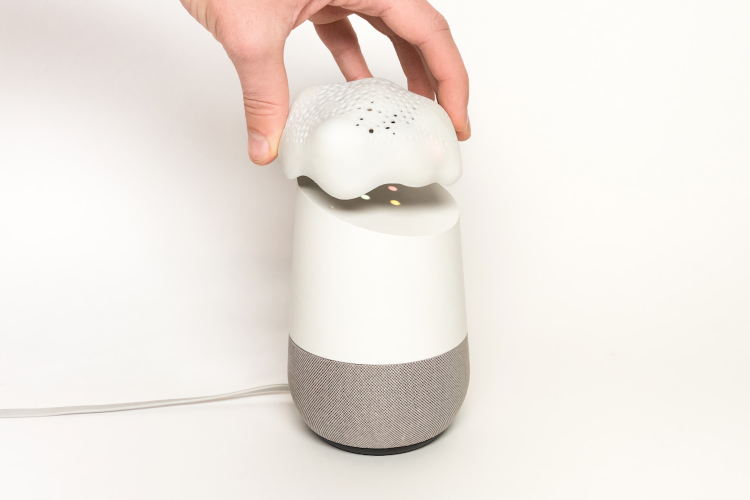Watch all the Transform 2020 sessions on-demand here.
Smart speakers have a problem: They occasionally record things they shouldn’t. In May of last year, a woman claimed that her Amazon Echo taped a private conversation and forwarded it to a person she didn’t know. And in December, a technical error resulted in Amazon sending an Alexa user 1,700 audio recordings of a stranger. It’s enough to give anyone the willies, but fortunately, a pair of developers have open-sourced a solution that prevents speakers like Google Home from listening in on people within earshot.
Bjørn Karmann and Topp designer Tore Knudsen’s Project Alias takes the form of 3D-printed housing that attaches to the top of a smart speaker. Inside, a Raspberry Pi-powered microphone and dual-speaker combo produce white noise that prevents the target speaker from activating. An offline voice recognition algorithm trained using TensorFlow, Google’s open source machine learning framework, disables the static when Alias recognizes a custom wake phrase, allowing anyone who knows the magic words to use it normally.
“We looked at how cordyceps fungus and viruses can appropriate and control insects to fulfill their own agendas and were inspired to create our own parasite for smart home systems,” Karmann and Knudsen wrote on the project’s webpage. “Therefore, we started Project Alias to demonstrate how maker-culture can be used to redefine our relationship with smart home technologies, by delegating more power from the designers to the end users of the products.”
Project Alias won’t allay privacy concerns about voice assistants anytime soon, as is probably right. Amazon, Google, and others store voice recordings to improve their respective intelligent assistants’ command-parsing abilities, a technological compromise most users aren’t comfortable with.
June 5th: The AI Audit in NYC
Join us next week in NYC to engage with top executive leaders, delving into strategies for auditing AI models to ensure fairness, optimal performance, and ethical compliance across diverse organizations. Secure your attendance for this exclusive invite-only event.
Two surveys — one from PricewaterhouseCooper in April 2018 and a more recent one by Accenture — found that a lack of trust in the makers of AI assistants could become a hindrance to consumer adoption. Among the U.S. residents surveyed as part of the former study, 18 percent said they don’t own a smart speaker or device with a voice assistant, with more than half saying that’s because of privacy concerns.
Their concerns aren’t without merit. Patent applications filed by Amazon describe voice recognition algorithms capable of analyzing a person’s sentiment, which might inform product recommendations and display advertising. Google, for its part, has a set of patents detailing audio systems that would recognize when a kid’s engaging in “mischief.”
Both Google and Amazon say they take privacy seriously and don’t use voice recordings for targeted advertising. But one thing’s certain: With tens of millions of smart speakers sold worldwide and voice shopping expected to hit $40 billion by 2022 in the U.S. alone, a future filled with voice-analyzing smart speakers is fast becoming a reality.


